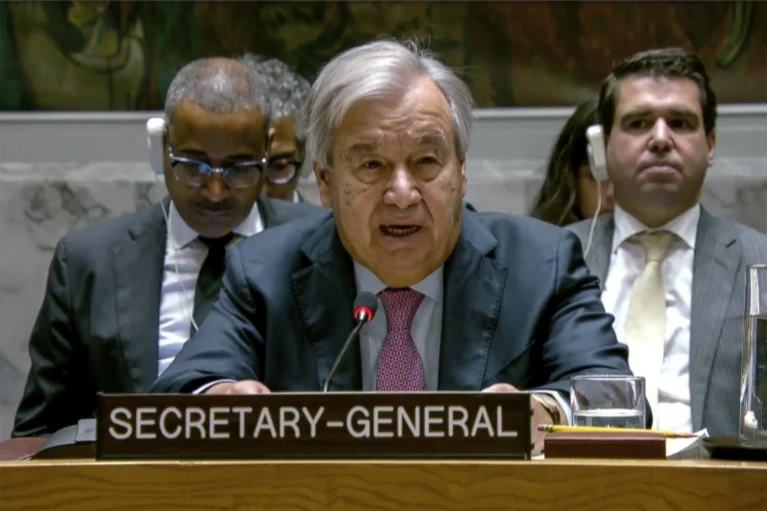UN orders budget cuts, staff relocations from NY included
The UN is preparing to relocate staff from New York and Geneva to cheaper cities amid fears of major US funding cuts under Trump
-

United Nations Secretary-General Antonio Guterres speaks during a Security Council meeting, October 2, 2024, at UN headquarters (UNTV via AP)
The United Nations has directed its agencies to prepare for significant budget cuts, including relocating staff from New York and Geneva to lower-cost cities, amid growing concerns that US President Donald Trump will sharply reduce US contributions.
In a two-page memo reviewed by The New York Times, dated April 25, Secretary-General Antonio Guterres instructed department heads to submit proposals by May 15 for inclusion in the 2026 budget.
“Your objective is to identify as many functions as possible that could be relocated to existing lower-cost locations,” the memo reads, “or otherwise reduced or abolished if they are duplicative or no longer viable.”
The memo followed an executive order signed by Trump in February to reassess US ties to the UN, after previously pulling the US out of several UN organizations, including those dealing with human rights, women’s reproductive rights, climate change, Palestinian aid, global health, and cutting funding to peacekeeping operations.
Three senior UN officials said the sweeping cost-cutting directive came as a surprise and was seen as an effort to shield the organization from further financial shocks.
Richard Gowan of the International Crisis Group said the UN’s portrayal of the changes as an internal reform masks anxiety over US pressure. “The US cuts, the range of the cuts and scale of the cuts have really shocked the UN,” he said, adding, “So Guterres is now frankly racing to catch up with a very bad situation.”
"What has thrown everyone off balance is how cuts have hit not only parts of the UN that the US traditionally dislikes, but parts of the UN that Washington has historically been favorable to."
— Richard Gowan (@RichardGowan1) April 28, 2025
I talk @GenevaSolutions with @telegramwriter & @loucharbon.https://t.co/LNvbFBAGR1
In March, Guterres launched the UN80 initiative to overhaul operations ahead of the organization’s 80th anniversary, citing long-standing financial strain.
"The United Nations is seeking ways to improve efficiency and cut costs as it turns 80 this year amid a cash crisis," said Guterres on March 12, 2025. He emphasized that the UN80 initiative aims to enhance effectiveness while addressing an ongoing liquidity crisis due to member states not paying dues on time or in full.
According to Reuters, as of March 7, only 75 member states had fully paid their regular budget assessments, with major contributors like the United States and China behind schedule. This liquidity crisis has led the UN to reduce planned spending by up to 20% and implement a hiring freeze to manage its financial constraints
Reach of budget cuts
Agencies have already begun implementing austerity measures. UNICEF expects at least a 20 percent budget drop in 2026 and is considering moving staff from New York to Valencia, Spain. The UN Population Fund plans to relocate its entire operation to Nairobi. Humanitarian chief Tom Fletcher has announced a hiring freeze, travel restrictions, and a 20 percent staff reduction. The UN now anticipates an overall 20 percent budget shortfall in 2026, amounting to billions in losses.
Last February, the United Nations Children's Fund (UNICEF) announced that it would reduce its operations in Lebanon as a result. And earlier this month, the United Nations’ emergency and disaster response agency (OCHA) announced it would scale back or withdraw operations in Cameroon, Colombia, Eritrea, Iraq, Libya, Nigeria, Pakistan, Turkey, and Zimbabwe due to the severe funding crisis. The OCHA announced that approximately 500 staff members from OCHA’s 2,600-strong workforce across more than 60 countries will be laid off.
Last week, the World Health Organization (WHO) announced sweeping restructuring plans as it faces a $560–$650 million salary gap for 2026–2027, following the US halt in funding and membership dues.

 4 Min Read
4 Min Read










